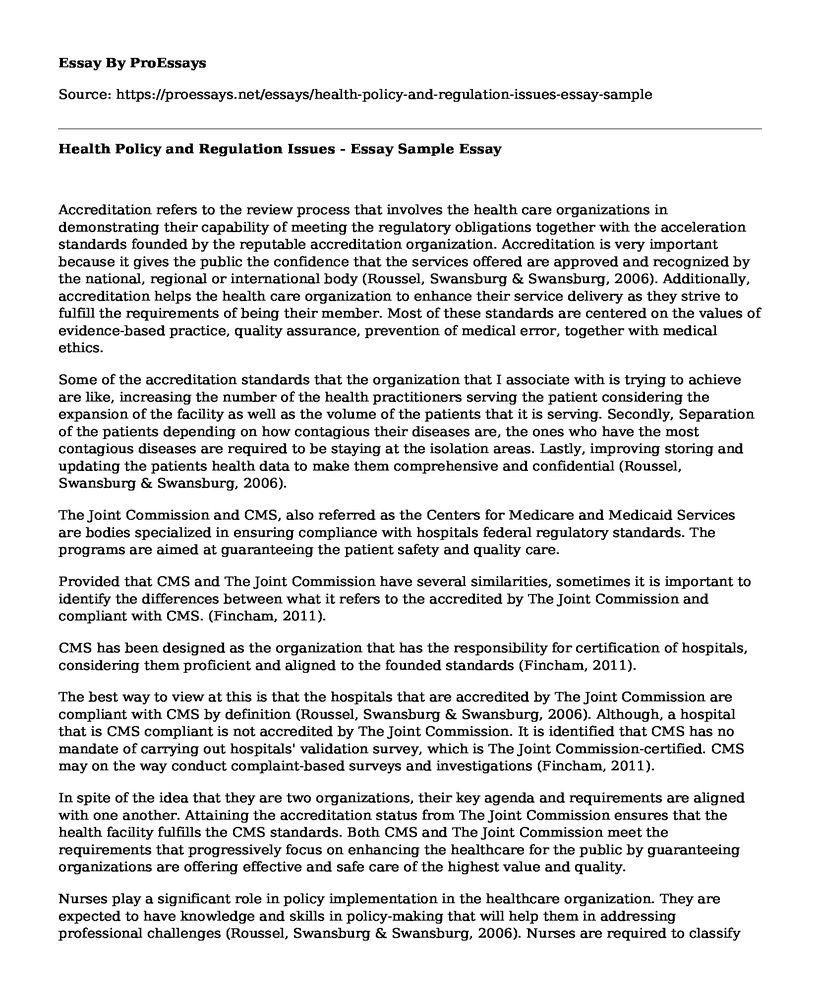Accreditation refers to the review process that involves the health care organizations in demonstrating their capability of meeting the regulatory obligations together with the acceleration standards founded by the reputable accreditation organization. Accreditation is very important because it gives the public the confidence that the services offered are approved and recognized by the national, regional or international body (Roussel, Swansburg & Swansburg, 2006). Additionally, accreditation helps the health care organization to enhance their service delivery as they strive to fulfill the requirements of being their member. Most of these standards are centered on the values of evidence-based practice, quality assurance, prevention of medical error, together with medical ethics.
Some of the accreditation standards that the organization that I associate with is trying to achieve are like, increasing the number of the health practitioners serving the patient considering the expansion of the facility as well as the volume of the patients that it is serving. Secondly, Separation of the patients depending on how contagious their diseases are, the ones who have the most contagious diseases are required to be staying at the isolation areas. Lastly, improving storing and updating the patients health data to make them comprehensive and confidential (Roussel, Swansburg & Swansburg, 2006).
The Joint Commission and CMS, also referred as the Centers for Medicare and Medicaid Services are bodies specialized in ensuring compliance with hospitals federal regulatory standards. The programs are aimed at guaranteeing the patient safety and quality care.
Provided that CMS and The Joint Commission have several similarities, sometimes it is important to identify the differences between what it refers to the accredited by The Joint Commission and compliant with CMS. (Fincham, 2011).
CMS has been designed as the organization that has the responsibility for certification of hospitals, considering them proficient and aligned to the founded standards (Fincham, 2011).
The best way to view at this is that the hospitals that are accredited by The Joint Commission are compliant with CMS by definition (Roussel, Swansburg & Swansburg, 2006). Although, a hospital that is CMS compliant is not accredited by The Joint Commission. It is identified that CMS has no mandate of carrying out hospitals' validation survey, which is The Joint Commission-certified. CMS may on the way conduct complaint-based surveys and investigations (Fincham, 2011).
In spite of the idea that they are two organizations, their key agenda and requirements are aligned with one another. Attaining the accreditation status from The Joint Commission ensures that the health facility fulfills the CMS standards. Both CMS and The Joint Commission meet the requirements that progressively focus on enhancing the healthcare for the public by guaranteeing organizations are offering effective and safe care of the highest value and quality.
Nurses play a significant role in policy implementation in the healthcare organization. They are expected to have knowledge and skills in policy-making that will help them in addressing professional challenges (Roussel, Swansburg & Swansburg, 2006). Nurses are required to classify issues intentionally and cooperate with their decision makers to promote health policies. Nurses need to comprehend with the hierarchy of powers and have information about who controls the health services resources in their organization. Thus, nurses are expected to get involved in the policies that affect the patients together with their families and also themselves as well as the entire healthcare system. The influence of nurses in the health policies, safeguards the patient safety, increasing the healthcare standards and give them access to the needed resources and enhance the healthcare standards (Roussel, Swansburg & Swansburg, 2006).
I had an opportunity of interviewing a nurse from the healthcare organization of my choice. The nurse affirmed that their organization is accredited by the Institute for Medical Quality (IMQ), which is a national organization. She further stated that they obtained the certifications and licensure also with the updates through the federal department of health, once they become members of the accreditation body, they get access to the updates of the accreditation institution.
She also confirmed that there are requirements that the nursing staff needs to fulfill so that they remain to be competent in their work, for instance, nurses need to meet the minimum qualification for their respective positions they have to be equipped with adequate knowledge of what is expected of them in delivering quality services to the public.
References
Fincham, J. E. (2011). Health policy and ethics. Pharmaceutical Press.
Roussel, L. A., Swansburg, R. C., & Swansburg, R. J. (2006). Management and leadership for nurse administrators. Jones & Bartlett Learning.
Cite this page
Health Policy and Regulation Issues - Essay Sample. (2021, Jun 15). Retrieved from https://proessays.net/essays/health-policy-and-regulation-issues-essay-sample
If you are the original author of this essay and no longer wish to have it published on the ProEssays website, please click below to request its removal:
- Articles Summary on Autism Spectrum Disorders
- A Reflective Essay on Indigenous Health
- Essay Sample on Self-Management Plan
- Essay on Nurse Practitioners: Impact of Regulatory Policies on Advanced Practice Nursing
- Essay Example on Personality Disorders: Challenging the 21st Century Diagnosis
- Paper Example on 30-Day Challenge: Get 6 Hours of Sleep & Improve Lifestyle
- Essay on Ensuring Public Health: A Comprehensive Overview of the California Health and Safety Code







